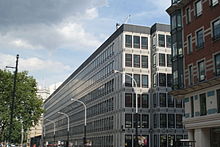
The Department of Trade and Industry (DTI) was a United Kingdom government department formed on 19 October 1970. It was replaced with the creation of the Department for Business, Enterprise and Regulatory Reform and the Department for Innovation, Universities and Skills on 28 June 2007.

The parliamentary committees of the United Kingdom are committees of the Parliament of the United Kingdom. Each consists of a small number of Members of Parliament from the House of Commons, or peers from the House of Lords, or a mix of both, appointed to deal with particular areas or issues; most are made up of members of the Commons. The majority of parliamentary committees are select committees. The remit of these committees vary depending on whether they are committees of the House of Commons or the House of Lords.
The Competition Commission was a non-departmental public body responsible for investigating mergers, markets and other enquiries related to regulated industries under competition law in the United Kingdom. It was a competition regulator under the Department for Business, Innovation and Skills (BIS). It was tasked with ensuring healthy competition between companies in the UK for the ultimate benefit of consumers and the economy.
A social enterprise is an organization that applies commercial strategies to maximize improvements in financial, social and environmental well-being. This may include maximizing social impact alongside profits for co-owners.
Private sector development (PSD) is a term in the international development industry to refer to a range of strategies for promoting economic growth and reducing poverty in developing countries by building private enterprises. This could be through working with firms directly, with membership organisations to represent them, or through a range of areas of policy and regulation to promote functioning, competitive markets.
The Shareholder Executive (ShEx) was a body within the UK Government between 2003 and 2016, responsible for managing the government's financial interest in a range of state-owned businesses for commercial rather than political interests. It was part of the Department for Business, Innovation and Skills and staffed by civil servants, many of whom were corporate finance professionals with private sector experience. It was led by Mark Russell as chief executive at the time of its merger into UK Government Investments.

Research Councils UK, sometimes known as RCUK, was a non-departmental public body that coordinated science policy in the United Kingdom from 2002 to 2018. It was an umbrella organisation that coordinated the seven separate research councils that were responsible for funding and coordinating academic research for the arts, humanities, science and engineering. In 2018 Research Councils transitioned into UK Research and Innovation (UKRI).

The Secretary of State for Innovation, Universities and Skills was a Cabinet minister in the United Kingdom, heading the Department for Innovation, Universities and Skills (DIUS). The post was created on 28 June 2007 from parts of the Department for Education and Skills (DfES) and the Department of Trade and Industry (DTI). It was merged with the Department for Business, Enterprise and Regulatory Reform (BERR) on 5 June 2009, to form the Department for Business, Innovation and Skills. The first and only Secretary of State was John Denham.

The Minister of State for Competitiveness was an office held by a member of the United Kingdom government and appointed by the Prime Minister of the United Kingdom.
Innovate UK is the United Kingdom's innovation agency, which provides money and support to organisations to make new products and services. It is a non-departmental public body operating at arm's length from the Government as part of the United Kingdom Research and Innovation organisation.

The Department of Energy and Climate Change (DECC) was a department of the Government of the United Kingdom created on 3 October 2008, by Prime Minister Gordon Brown to take over some of the functions related to energy of the Department for Business, Enterprise and Regulatory Reform, and those relating to climate change of the Department for Environment, Food and Rural Affairs.

The secretary of state for energy and climate change was a British Government cabinet position from 2008 to 2016. The Department of Energy and Climate Change was created on 3 October 2008 when then-Prime Minister Gordon Brown reshuffled his Cabinet.
Coalclaims or Coal Health Claims is the collective name for two compensation schemes run by the UK Government. Responsibility for the claims lies with the Department of Energy and Climate Change which split off from the Department for Business, Enterprise and Regulatory Reform (BERR) in October 2008. BERR itself was a rename of the Department of Trade and Industry (DTI).

The Department for Business, Innovation and Skills (BIS) was a ministerial department of the Government of the United Kingdom. It was created by the Gordon Brown premiership on 5 June 2009 by the merger of the Department for Innovation, Universities and Skills and the Department for Business, Enterprise and Regulatory Reform. It was disbanded by the Theresa May premiership on the creation of the Department for Business, Energy and Industrial Strategy on 14 July 2016.
The Business and Trade Select Committee is a select committee of the House of Commons in the Parliament of the United Kingdom. The remit of the committee is to examine the expenditure, administration and policy of the Department for Business and Trade, and any departmental bodies.
The Better Regulation Executive is a part of the British Department for Business and Trade.

The Competition and Markets Authority (CMA) is the principal competition regulator in the United Kingdom. It is a non-ministerial government department in the United Kingdom, responsible for strengthening business competition and preventing and reducing anti-competitive activities. The CMA launched in shadow form on 1 October 2013 and began operating fully on 1 April 2014, when it assumed many of the functions of the previously existing Competition Commission and Office of Fair Trading, which were abolished. The CMA also has consumer protection responsibilities and will also be taking on new digital markets regulation responsibilities in late 2024 under the Digital Markets, Competition and Consumers Act 2024.

The Department for Business, Energy, and Industrial Strategy (BEIS) was a ministerial department of the United Kingdom Government, from July 2016 to February 2023.

The Secretary of State for Business and Trade (Business Secretary), is a secretary of state in the Government of the United Kingdom, with responsibility for the Department for Business and Trade. The incumbent is a member of the Cabinet of the United Kingdom.

The Department for Business and Trade (DBT) is a ministerial department of the Government of the United Kingdom. It was established on 7 February 2023 by a cabinet reshuffle under the Rishi Sunak premiership. The new department absorbed the functions of the former Department for International Trade and some of the functions of the former Department for Business, Energy, and Industrial Strategy.











